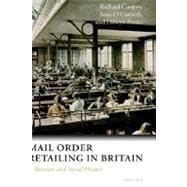
Note: Supplemental materials are not guaranteed with Rental or Used book purchases.
Purchase Benefits
What is included with this book?
| List of Illustrations | ix | ||||
| List of Tables | x | ||||
| Introduction | 1 | (12) | |||
| 1. General Mail Order Retailing in Britain: Origins and Development till 1939 | 13 | (30) | |||
|
14 | (6) | |||
|
20 | (5) | |||
|
25 | (2) | |||
|
27 | (5) | |||
|
32 | (11) | |||
| 2. The Evolution of Mail Order Retailing in Post-war Britain | 43 | (34) | |||
|
44 | (4) | |||
|
48 | (2) | |||
|
50 | (6) | |||
|
56 | (11) | |||
|
67 | (10) | |||
| 3. Working-Class Life, Consumer Credit, and the Making of Agency Mail Order | 77 | (30) | |||
|
78 | (6) | |||
|
84 | (7) | |||
|
91 | (5) | |||
|
96 | (11) | |||
| 4. Mail Order Agency in Post-war Britain: The Agent, The Company, and The Customer | 107 | (32) | |||
|
108 | (3) | |||
|
111 | (7) | |||
|
118 | (4) | |||
|
122 | (6) | |||
|
128 | (4) | |||
|
132 | (7) | |||
| 5. Inside the Firm: Mail Order, Efficiency, and Rationalization-From Personal to Organizational Control | 139 | (34) | |||
|
140 | (4) | |||
|
144 | (4) | |||
|
148 | (6) | |||
|
154 | (2) | |||
|
156 | (2) | |||
|
158 | (15) | |||
| 6. Disconnecting the Personal: Computers and Mail Order | 173 | (30) | |||
|
174 | (2) | |||
|
176 | (4) | |||
|
180 | (5) | |||
|
185 | (3) | |||
|
188 | (3) | |||
|
191 | (1) | |||
|
192 | (4) | |||
|
196 | (7) | |||
| 7. The Second Home Shopping Revolution | 203 | (28) | |||
|
204 | (8) | |||
|
212 | (3) | |||
|
215 | (16) | |||
| 8. Conclusion | 231 | (8) | |||
| Index | 239 |
The New copy of this book will include any supplemental materials advertised. Please check the title of the book to determine if it should include any access cards, study guides, lab manuals, CDs, etc.
The Used, Rental and eBook copies of this book are not guaranteed to include any supplemental materials. Typically, only the book itself is included. This is true even if the title states it includes any access cards, study guides, lab manuals, CDs, etc.